Poland’s ministry of memory spins the Holocaust

ARTWORK BY RAFAL MILACH/MAGNUM PHOTOS
For years Olympic slalom canoeist Dariusz Popiela, 36, trained on the Dunajec river in southern Poland. During his twenties, he paddled every day on a churning stretch between two bridges in his hometown of Nowy Sacz. He never thought that this place so familiar to him would become the source of what can be called his memory rebellion. Popiela has always been fascinated by history. He grew up quizzing his grandfather about his childhood memories of life in Nazi-occupied Poland.
But there was an enormous chapter that his grandfather had ripped out of his mental storybook of recollections: the nearly 12,000 Jews who lived in Nowy Sacz before 1939 — about a third of the town’s pre-war population. They had disappeared from the town’s memory. Absent from lessons at school, it wasn’t until Popiela began his own research that he learned about the scale of Jewish life in Nowy Sacz and in Poland. With a thousand years of Jewish history, the country was home to the world’s largest Jewish population outside of the United States at the start of World War II.
Popiela was floored when he read the details of how Jewish residents from his town were transported to the neighboring Belzec death camp. Many spent their final night in Nowy Sacz huddled on the riverbank exactly between the two bridges where he had paddled in his canoe so often.
“They saw this same view. They heard the same river voices and sounds,” Popiela said when we stood by the riverbank this past May. Running through some of the most picturesque scenery in southern Poland, the Dunajec river flows through steep gorges, pine forests and fields of tall grass growing right up to its fast-moving waterline. Popiela pointed to families cycling by and couples walking along the river path. “Half of the city disappeared and you have no memory,” Popiela said, shrugging his shoulders. “How is that possible?”
Since his discovery, Popiela has led dozens of commemorations to Jewish life across Poland through his foundation “People, Not Numbers.” Popiela is part of a new generation of Polish citizens, historians, writers and educators pushing for a more honest confrontation with Poland’s 20th century history.
For decades, Polish-Jewish history was kept in what scholars call “the communist freezer.” Around three million Polish Jews were murdered by the Nazis. It wasn’t until the 1960s that Polish communist authorities tolerated much discussion of the genocide. When they did — such as during an anti-semitic purge of the party in 1968 — it was to blame Jews for not showing enough gratitude towards ethnic Poles who tried to save them.
After the fall of communism, some of that silence was broken. More recently, the country’s ruling right-wing government has been consolidating a nationalistic narrative about the past that emphasizes pride over what they say are a politics of shame. It has been effective. Recent surveys show Polish people believe that more than half of Poles directly helped or hid Jews in their homes during Nazi occupation, an absurd overestimate. Those like Popiela who work to commemorate Jewish victims are accused of promoting what’s been coined by the government as a “pedagogy of shame.” The term is used as a political slur by Jaroslaw Kaczynski and members of the party he leads, the ruling Law and Justice party. It has come to mean a liberal historical agenda that exaggerates dark facets of Polish history.
At the center of these competing historical narratives is Poland’s ministry of memory — called the National Institute of Remembrance, IPN in Polish, which was created in the early 2000s to deal with the country’s communist legacy, manage the historic KGB archives and prosecute crimes committed under communism. Today the Institute also largely deals with the legacy of Nazi occupation and is charged with defending the country’s “good name.” The IPN was at the center of international fury in 2018 when the government passed a “Holocaust law,” known as the “IPN law” within Poland, making it a criminal offense to “defame” the Polish nation by claiming Polish people had responsibility for Nazi crimes.
The IPN is one of Poland’s most powerful institutions, with its budget making it the largest institute of historical research in the country, eclipsing university history departments and independent research institutes. A one-of-a-kind bureaucratic creation, it is the country’s most prolific publisher of historical texts, a prosecutor’s office, a production house of historical films and games, and a major authority shaping what students across the country are taught about history in school. The Institute of Remembrance’s budget has nearly doubled under the Law and Justice Party, which has been in power since 2015. Today it has an annual budget of 430 million PLN ($105 million), a staff of about 2,000 and 11 regional branch offices.
With its leadership appointed by parliament, the Institute is controversial in an already highly polarized political environment. There is demand from a number of leading historians for the Institute to be dismantled or reformed. Far more widespread opposition comes in the form of local level initiatives like Popiela’s that are trying to change memory culture in Poland.

ARTWORK BY RAFAL MILACH/MAGNUM PHOTOS
A memory rebellion
When Popiela learned about the concentration camp on the banks of the Dunajec, just steps away from the beautifully preserved town square in Nowy Sacz, his first feeling was in fact shame.
Each new detail that emerged felt personal: the dam further up the Dunajec river was built by forced Jewish labor, he discovered; and he later found slabs of 17th century matzevot, or Jewish gravestones, used in the construction of town infrastructure, their Hebrew script just barely still legible off the curb of a busy roadside.
“But the shame was something that gave me power,” said Popiela. “It gave me rebellion and the power to do something.”
For the past ten years, Popiela has devoted the time he has outside of his sport to commemoration work. With just a handful of members, his foundation, People, Not Numbers, has researched archives and interviewed older residents to identify the name, surname and age of Jewish victims across rural Poland. They’ve installed 10 monuments and discovered 10 mass Jewish grave sites. Volunteers maintain a number of Jewish cemeteries that were abandoned. Popiela self-publishes what he calls — with a wink — his “underground” monthly newspaper about Jewish history in Nowy Sacz. He leaves out stacks at local coffee shops and in the town hall.
When we meet in May, Popiela is about to break ground on his most recent project: a memorial park in Nowy Sacz located within what had been the town’s Jewish ghetto along with the installation of a plaque along the Dunajec river bank at the site of the former camp. All of the efforts are crowdfunded by Popiela. I asked him, why is he — an Olympic canoeist about to compete in the European Championships — doing this in a country that’s created an entire state bureaucracy to deal with historical remembrance.
“They are caring about other stories,” he said. I push him to elaborate and he gives an example. A few years ago the foundation tried to team up on the commemoration of a Jewish family of eight, murdered in 1944 after being turned over to the Gestapo by their neighbor. The Institute’s local branch said the memorial plaque must say that this family was killed by the Nazis. Popiela refused.
“Do you put the name of the murderer of your family on their grave?” asked Popiela. It’s the same demand he’s just recently received in an open letter from several local, patriotic organizations in opposition to his plan for building a monument to Jews killed in Nowy Sacz. “They don’t have the point of view of the victims. The most important part for them is the sign that the Germans made the Holocaust.”
Poland has long tried to police language around the Holocaust. When former U.S. President Barack Obama referred to “Polish death camps” during a 2012 visit to Warsaw, the White House was compelled to apologize. Right-wing lawmakers made several attempts to introduce a three-year prison sentence for using the term.
A widely shared perception among Poles is that the rest of the world underappreciates Polish suffering during Nazi occupation. “They have this obsession that starts when people say that Polish people are responsible for the Holocaust. Now the narrative of the IPN is that nearly all Polish people had a Jew hidden in their basement,” said Popiela. “They are saying that we were all heroes. But from the archives, it doesn’t look so nice.”
I took a ride with Popiela over to the neighboring town of Grybow where in 2019 he and his team of volunteers had installed a memorial in a Jewish cemetery on a hill overlooking the town. Abandoned for 80 years, the cemetery was a fenced-in jungle. Today, it’s a peaceful, wooded plot with several informative plaques displaying photographs of victims installed by the foundation. The centerpiece is a large granite monument of a splintered matzevah, with slabs on either side listing the name and ages of the nearly 2,000 Jewish victims killed in Grybow during the occupation, nearly a third were children under the age of 13.
Further uphill, Popiela crouches down and starts pulling the weeds coming up over a mass grave site they had discovered using a drone and geo-radar. He tells me about some of the online hate he gets for his work, people accusing him of working for George Soros or telling him he’d be better off spending his time cleaning up Catholic cemeteries. When seeking funding, he’s often told to find some “rich Jew” to pay for the memorial.
We drive back down the hill from the cemetery to town and pass the local Grybow church. It’s Sunday afternoon and the red brick church is packed, with dozens of people crowding at the doors and even standing in the square outside. Just a few steps away from the towering basilica stands Grybow’s Jewish synagogue, abandoned and with its windows knocked out. There are no Jewish people in Grybow. Across from the synagogue an artist has recently painted a large mural in sepia tones. The mural is based off of a 1922 photograph showing three generations of Grybow’s lost Jewish residents.

ARTWORK BY RAFAL MILACH/MAGNUM PHOTOS
The Ghosts are coming back
“We are the main enemies of the Institute of National Remembrance,” said Agnieszka Haska, a cultural anthropologist at the Polish Center for Holocaust Research in Warsaw. It’s one of the first things she tells me when we meet.
Much of Haska’s work focuses on questions of collaboration and Jewish escape from occupied Poland and she says the IPN has put her publications and other writings from the center constantly under the microscope. The institutes’ team of fact checkers flags perceived mistakes, sometimes even a footnote, and publishes lengthy rebuttals. The vice president of the IPN told me it’s part of an “ongoing academic debate.” Called traitors on public TV channels, Haska said “it feels much more like an ongoing war.”
It can also get petty. Haska says she’s called the IPN numerous times asking them to stop their regular deliveries of the latest IPN volumes of historical research to the Holocaust Research Center’s office. The institute’s historians are prolific, publishing up to 300 titles a year. The publications flood national bookstores and are subsidized, making it even harder for non-IPN authors to sell their titles. “They are trolling us!” Haska said.
Some of Haska’s recent writing looks at Polish antisemitic science fiction, a popular genre during the 19th century. Writers could pass off their anti-Jewish texts as “fantasy” books to get by the Russian empire’s censors. Haska is focusing on one novel written by Tadeusz Hollender in 1938 called “Poland Without Jews.” Largely lost to history, Hollender’s fantasy fiction was meant as a critique of Polish antisemitism. In Hollender’s satire, the Jews of Poland finally decide they’ve had enough. Families across the country pack up their belongings and begin a long journey to a new land, settling on Madagascar. Suddenly, Christian Poles find that they have no more Jewish neighbors, no one to beat up or to blame for their misfortunes. It turns out that life in Poland without Jews isn’t what they had hoped. So the characters in Hollender’s fiction summon a delegation that sets off for Madagascar and begs their Jewish compatriots to return back home with the words, “We don’t know who we are without you.”
Just a few years after Hollender’s book was published in 1938, the German army retreated from Poland. The Jews had been almost entirely exterminated. Close to 90% of Polish Jews were murdered in the Holocaust. About 20% of Poland’s total population died of war-related causes, including author Tadeusz Hollender who was shot by the Gestapo in 1943 for his role in the Polish underground. After the war, many of the Jews who managed to survive emigrated to Israel or the U.S.
Writing about the Second World War in Poland, the country’s most well-known historian Jan Gross quoted a Holocaust-era memoir: “This was a war which no one quite survived.” Nearly six million Poles perished during the six years of Nazi occupation. Gross gives some numbers to describe the utter devastation of Polish urban life: nearly a third of all urban residents missing following the war, 40% of Polish doctors killed, 30% of university professors and Catholic clergy and 55% of lawyers dead by the end of the war. Soviet occupation brought its own brutality, with the massacre of 22,000 Polish military officers by the Soviet Army in 1940 in Katyn and campaigns of terror waged across the country by the NKVD, the Soviet secret police.
To this day, many in Poland remain bitter, believing they had been sold out to the Soviet Union by the West at the end of the war, condemned to 50 years of communist authoritarianism. “Eighty years on, the Second World War still dictates our present,” said Haska. “It’s really scary if you think about it, but the world really ended on the first of September 1939.”
Haska then tells me about one of her first trips to Israel years ago. She remembers her shock, and shame, when people across the country immediately recognized the name of her hometown of Ciechanow in northwest Poland, population 43,000. She got a history lesson from the Israelis she met about how the town used to be nearly half Jewish and about Roza Robota, one of the four women who led an uprising in Auschwitz in September 1944. She was from Ciechanow.
“Everybody knew where Chiechanow was and everybody knew her name,” Haska remembers. “I grew up 50 meters from a Jewish cemetery in Ciechanow and I had no idea.”
The only trace of Robota’s life in Ciechanow is a street named after her, stretching for three blocks on the outskirts of town. Three short blocks that reflect the preference for certain historical narratives by the Law and Justice party and the IPN. Jewish victims of the Holocaust are commemoratated as a backdrop for a sweeping story of Catholic Polish heroism and resistance. Little to no space is allowed for one of the cruelest truths of 20th century authoritarianism: People became complicit in their own subjugation.
This truth is one of the opening observations in Jan Gross’s book “Neighbors,” which rocked Poland on publication in 2000 and is still highly controversial today. The book details the previously unstudied July 1941 massacre of Polish Jews by their non-Jewish neighbors in the town of Jedwabne. During the pogrom, Gross writes that German involvement was limited to standing by and taking photographs. In the early 2000s, the newly created IPN confirmed that it was the Polish residents who killed their neighbors. A year after the book was published, at a ceremony in Jedwabne, Polish President Aleksander Kwasniewski publicly begged for forgiveness.
More recently there’s been backlash. There is an ongoing campaign to exhume the bodies of the Jewish victims in order to prove that they were killed by German soldiers, and not their neighbors. Commenting about Jedwabne and the Kielce massacre, led by Polish residents in 1946 in a northern town after the war, the country’s minister of education refused in a 2016 interview to acknowledge that Polish people were responsible, saying that this “has been misunderstood many times.”
Overnight in Jedwabne, an entire town learned that their grandparents either took part, or stood by, in the brutal massacre of Jews, many of whom were burned alive. There are a number of historians studying historical backlash in Poland. Social psychologist Michal Bilewicz has looked at how people who have experienced historical trauma are more prone to believe in conspiracy theories as an adaption to the trauma, and how educational programs about the Holocaust have in some cases caused symptoms of PTSD in Polish participants or fueled disbelief and a rejection of the facts.
During our meeting in Warsaw, Haska told me a story about her aunt who a few years ago got a knock on the door of her home, a beautiful villa built in the 1930s. The woman at the door was German and she had come to see if her old family home was still standing. She had grown up there as a little girl when the territory was part of Germany. In January 1945, the family fled as the Soviet Army advanced across Poland. The women spoke to each other in German. Haska’s aunt told the visitor how her two brothers were killed by the Gestapo in 1943. The German woman shared her memory of her little brother dying as the family escaped their home in the winter of 1945.
“Half of Poland is living in someone else’s home, not only Jewish but German too,” Haska said. “But the ghosts are coming back.”
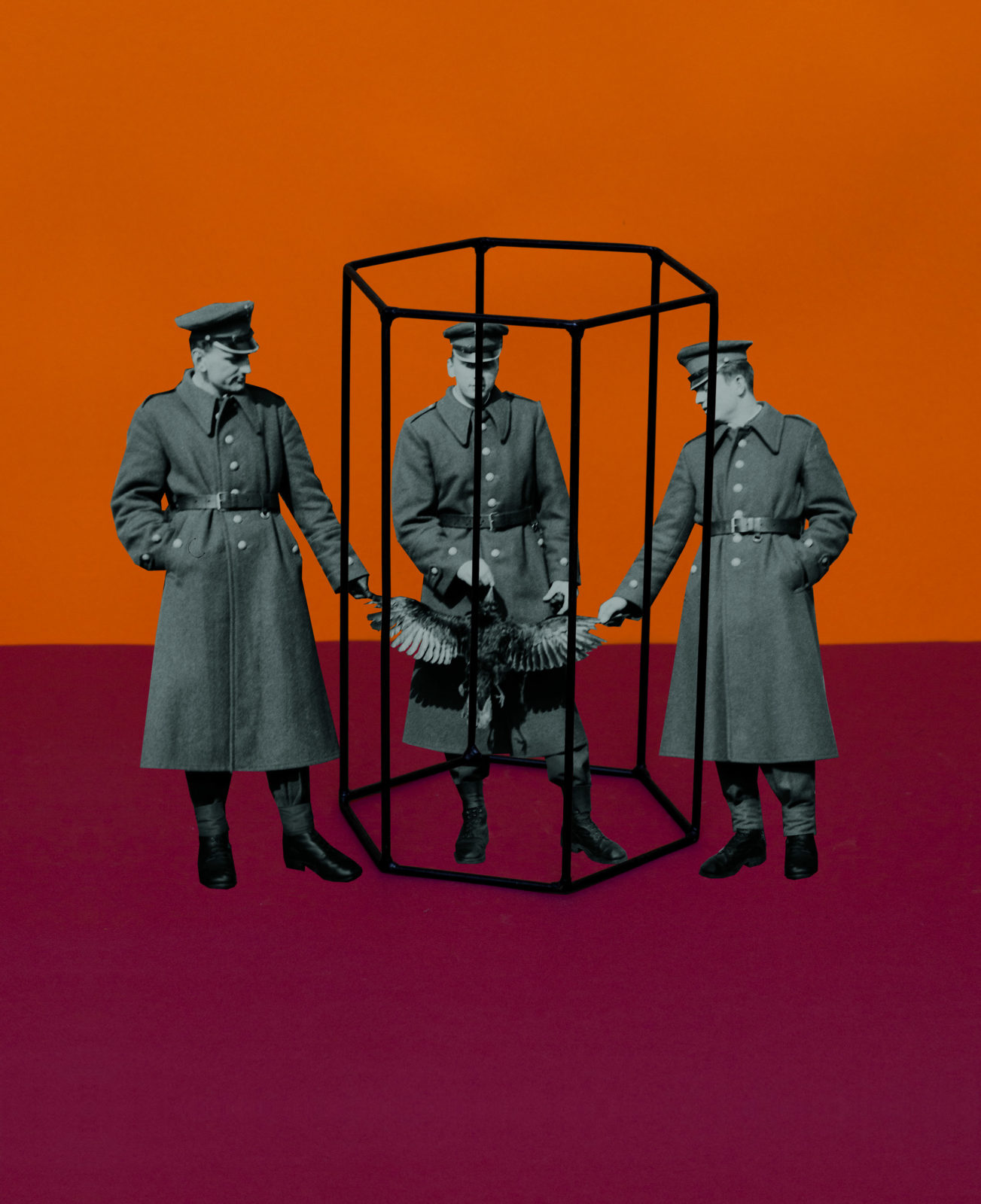
ARTWORK BY RAFAL MILACH/MAGNUM PHOTOS
Patriotic Blackmail
Across Poland, there’s a history museum boom. Over the past fifteen years, nearly a dozen new history museums have opened. In pre-covid years, museums in Poland — a country of 38 million — had 38 million visitors, topping ticket sales for the national soccer team. A number of these new museums have also ushered in scandals and embarrassing international headlines.
In 2020, the director of Warsaw’s renowned POLIN Museum, historian Dariusz Stola, was pushed out by the government. In 2017, the Minister of Culture replaced the director of Gdansk’s new World War II Museum with a more friendly candidate — historian Karol Nawrocki, who today serves as President of the Institute of National Remembrance. The Museum of the Warsaw Ghetto Uprising hasn’t even opened yet but is already drawing accusations of politicizing history. Another museum, the Warsaw Uprising Museum which opened in 2004, found itself again in the media spotlight after unveiling a new “Room of the Young Insurgent” exhibition, filled with stuffed animals, crayons and the “inspirational” stories of young child combatants in WWII, along with a statue of a Polish child soldier holding an automatic weapon.
While the IPN is not tied to any of these museums, the Ulma Family Museum of Poles Saving Jews is perhaps the best brick and mortar representation of the institute’s politics. Opened six years ago, the Museum was curated by the IPN’s current vice president, Mateusz Szpytma.
Polish President Andrzej Duda attended the opening ceremony of the museum — located two and a half hours outside Krakow in the village of Markowa, population 4,000.
“The world does not know the reality that prevailed in Poland during the years of occupation, and it is this ignorance that hurts the good name of our country,” Duda said in a speech in the museum’s courtyard.
In photos from the opening day, Duda is lit up by some of the courtyard’s thousands of glowing plaques, each carrying the name of a Polish citizen murdered for helping Jews during the war. Many of them have received Israel’s esteemed designation of the Righteous Among Nations given to people who undertook extraordinary risks to help Jewish people during the war. Poland has the largest number of Righteous internationally: over 7,000 Polish citizens, many of whom were killed for their actions.
The museum tells the story of the Ulma Family who sheltered eight Jews in Markowa during German occupation. After being denounced, the entire Ulma family along with the Goldman, Didner and Grunfeld families were shot to death, seventeen people including children and an unborn child.
Walking through the courtyard to the museum entrance, visitors first see a large illuminated photograph of the Ulma family, taken by the family’s father, Jozef Ulma. Ulma was by all accounts a renaissance man who took dozens of photos of his family with his camera, a rare and prized possession in a Polish village in the 1930s.
The exhibition, housed in a minimalist, modern metal and glass structure, features many photos he took of his family, neighbors and surrounding landscape, some still stained in the family’s blood. The Ulma Family Museum highlights the cruelty of the war, that 20% of Markowa’s Jews survived the war in hiding — an unusually high survival number — and the intense pressure villagers faced to collaborate and inform.
“I would like every visitor to this museum, among others, to know the drama that befell the Jewish people during World War II,” said the IPN’s Vice President Mateusz Szpytma who was the first historian to lead the investigation into the Ulma story. He estimates that tens of thousands of Jews survived in Poland thanks to help from non-Jews. “I would like them to know that even in the most difficult moments of totalitarianism there is the possibility of helping people in need. It is up to us individually how we behave, whether we stand with traitors, whether we are heroes, whether we risk our lives for other people.”
Outdoors there’s a large memorial grave to the family with a Polish coat of arms, a cross and on the ground, a fresh bouquet of red roses. Seven urns with the remains of the Ulma family are displayed. The Jewish victims who were hiding at the Ulma family home are buried elsewhere, in a military cemetary about 15 miles away. Golda Grunfeld, Lea Didner and her child as well as five men by the name of Goldman are not listed. They are memorialized collectively with some of the three hundred nameless Jewish Poles murdered during the war and buried there.
Some of Poland’s most prominent historians, Jan Grabowski, Agnieszka Haska at the Holocaust Research Center among others, have been vocal critics of the framing of the exhibition. The Ulma Museum in some ways is an important break with the past. For decades in Poland, people given the Righteous designation hid it from their neighbors and family members out of fear of stigmatization and persecution. Honoring them on a national level has been long overdue, but critics say this is being done at the expense of the Jewish people they saved who are reduced to vehicles for Polish heroism.
“As a Polish citizen, a Polish researcher, I’m totally into commemorating these rare exceptions of noble Poles who were brave enough to somehow oppose this wartime reality. But at the same time these biographies are being used as a kind of patriotic blackmail,” said Maria Kobielska, who co-founded the Center for Research on Remembrance Culture at Jagiellonian University in Krakow. She has been researching new history museums and has written about the Ulma Museum.
“The general message is that this was the typical attitude of Polish people, to act as Jozef and Wictoria Ulma. If you oppose this narrative and this museum you somehow oppose the memory of the Ulmas,” Kobielska said. “These people are used as an alibi for anyone who is Polish.”

ARTWORK BY RAFAL MILACH/MAGNUM PHOTOS
Maria Babinska at the Center for Research on Prejudice at Warsaw University has been running social psychology surveys over five years. “We asked people to imagine — since the specific historical percentages are not known and will never be known — their estimate of how many Poles collaborated with Germans and the percentage who were indifferent,” said Babinska.
The study showed that Polish people believe that close to 60% of Poles selflessly helped Jews during World War II, but also believe that 25% of Poles collaborated with Nazis.
The results were highly polarized, a split based on which political party respondents voted for but also by factors such as expressing antisemitic views or supporting the IPN Holocaust law.
I asked the IPN’s vice president Mateusz Szpytma what he made of these numbers: “I don’t think Poland is an exception here, people misperceive history,” said Szpytma. “It’s important to show history as it was, what you have to be proud of and the things that were bad, you have to be ashamed of them. These two sides are strongly present in our work at the Institute of National Remembrance.”
Babinska attributes the results of her research to basic human psychology: members of a community often overestimate the morality of their group.
Morality, identity, being part of an ingroup have all been powerful themes in the Law and Justice party’s electoral campaigns. Campaign slogans and speeches reinforce the country’s Catholic and Polish identity, patriotic resistance to Nazi occupation and communism.
“Memory policy is a substitute for ideology that legitimizes the party,” says Dariusz Stola, the deposed director of Warsaw’s POLIN Museum and a historian at the Polish Academy of Sciences.
Since 2015, the Law and Justice party has crafted an official party “strategy” for its historical policy with President Duda saying that “conducting historical policy is one of the most important activities of the president.”

ARTWORK BY RAFAL MILACH/MAGNUM PHOTOS
People’s history
Maciej Sanigorski and Jeremi Galdamez are guarding a different kind of memory that is even more unpopular in the country than Jewish-Polish history — the history of Polish communism. Since 2017, the IPN has reinvergerated the country’s decommunization efforts of the 1990s, changing street names and removing over 200 monuments across Poland which “symbolize or propagate” totalitarianism. It’s the most public-facing work of the IPN, with the Institute’s current president holding video press conferences as workers drill and demolish monuments behind him in the shot.
Sanigorski, who works in transport for the Polish post office, and Galdamez, who writes for a history magazine and whose father was a member of Chile’s communist youth and fled political persecution for Poland in the 70s, are both left-wing organizers in Warsaw and have led a campaign to preserve the memory of Polish volunteers who fought in the Spanish Civil War in the 1930s. Poland had the second largest group of international volunteers fighting in Spain against Franco’s fascists.
So far, their biggest victory was gathering over a thousand signatures necessary to oppose an IPN order to change a street name in Warsaw named after the Polish brigade. It was a considerable undertaking in a post-communist country where anything related to socialism remains toxic.
Sanigorski and Galdamez took me past the sites where some of Warsaw’s communist monuments have disappeared overnight. Along with holding discussions about historical policies, they organize an annual memorial service for Poland’s fighters in a military cemetery in Warsaw, with delegations from Spain, Germany and Italy joining this year.
“I always say if I lived in communist times I would fight for the memory of the anti-communist resistance because you have to fight for the things that are being thrown away from history,” said Sanigorski.
Valentin Behr, a political scientist at the Paris Institute for Advanced Study, says the group is one of dozens of grassroots initiatives in opposition to the decommunization of public space and demonstrates that sometimes national memory politics can end up backfiring.
“It’s a way to produce a counter narrative to the official narrative and to show that there is another Poland that is not conservative, not fascist, which is progressive and that is forgotten most of the time in collective memory.”
Both Sanigorski and Galdamez object to the historical policies of the IPN — which they call an Orwellian ministry of truth, enforcing memory politics down to street names in small towns all across the country. However, both said it would be complicated to do away with it completely. Nearly everyone I asked had a different take on what to do with the IPN. While there’s no indication of the Institute going anywhere under the current government, there is an ongoing debate on how it could be reformed, or even dismantled if the opposition regains the majority.

ARTWORK BY RAFAL MILACH/MAGNUM PHOTOS
Guardians of Memory
Adam Musial, a high school history teacher in Krakow for 22 years, quit his job in 2019 after finding it increasingly difficult to teach the Holocaust. “The general atmosphere in Poland surrounding memory simply reinforced my decision,” he said.
As part of a research grant he has been interviewing about 20 teachers across the country. They tell him it’s become more difficult for them to work. “The atmosphere is stifling,” he said.
He offered an example of a teacher who had tried to bring a Jewish Holocaust survivor to the school. During a faculty meeting, another teacher suggested that if they go ahead with the visit it would be best to bring in more than one speaker to offer students different perspectives on the subject. “So what, I should invite a Nazi?” the teacher quipped, eventually dropping the idea altogether.
For the past year, lawmakers have debated a new Polish law that would make it even harder for teachers to bring in outside speakers or participate in extracurricular programming. Right-wing politicians have rallied against “moral corruption” in schools — largely code for sex education — and pushed through a law that would make teachers seek written permission to bring in any outside speaker or organizations that aren’t on a selective, pre-approved government list. Along with sex education, this would shut down the majority of in-school Holocaust education activity. However, after passing through the Polish parliament, the law was vetoed by President Duda who asked lawmakers to ”postpone it,” citing the ongoing war in Ukraine. It appears the law would complicate integrating the hundreds of thousands of Ukrainian refugee students into Poland’s schools.
But the year of uncertainty has already left a mark: Poland’s largest and oldest non-profit organization dedicated to Jewish-Polish communication has been restructuring their programming, orienting away from schools to be more resilient to politics. Since 1998, the Forum for Dialogue has brought Holocaust survivors and educators to nearly 10,000 students in 400 schools across Poland, focusing on programming in small towns and villages that once had a Jewish community. A core part of the program — known as the School of Dialogue — has students at partner schools lead independent research on their community’s Jewish history, which culminates in a student-led public walking tour for local residents.
Now, the Forum is leaning into their other programs such as directly educating teachers and growing their existing network of over a hundred local historical activists across Poland. The Forum calls them “guardians of memory” — Dariusz Popiela from Nowy Sacz is one of them.
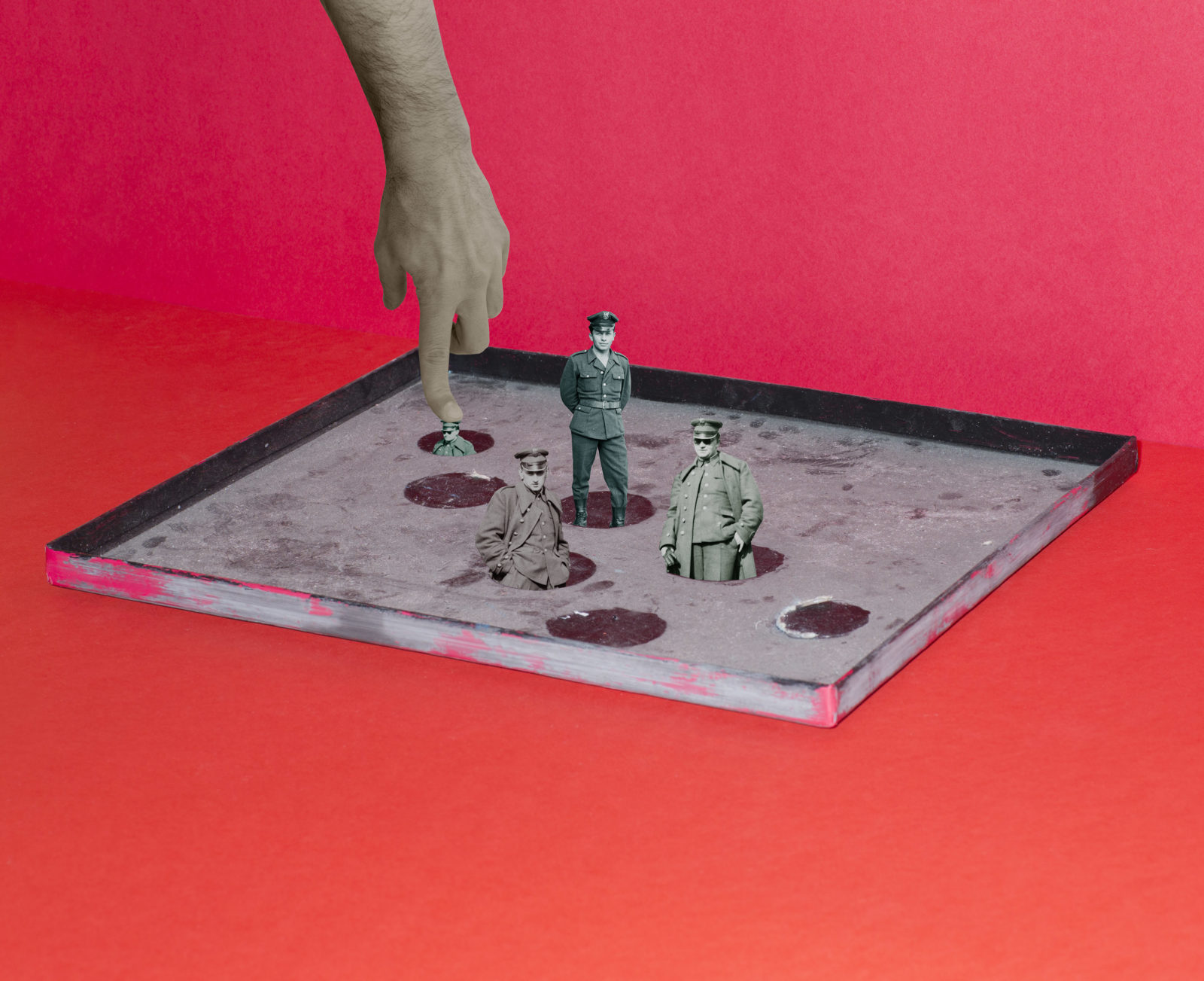
ARTWORK BY RAFAL MILACH/MAGNUM PHOTOS
Backfire
Back in Nowy Sacz, Popiela tells me about how he got lunch with his grandfather a few years ago. Popiela had already started his commemoration work at that point and they were discussing a project. At one point he noticed tears in his grandfather’s eyes. For the first time he told Popiela about a memory he had as a young boy. The town’s ghetto had been liquidated and the walls separating the ghetto from the rest of the town had come down.
His grandfather told him how he walked through the empty ghetto streets and then saw a few boys his age hiding in one of the buildings. Books, some even with gold Hebrew lettering, were scattered across the pavement. He told Popiela how stupid he felt that his family and others had gathered and burned the books because they had nothing left to make a fire with. And then he started to cry.
While his grandfather and father both support the ruling party, he says they’ve come around to his work and today the entire family pulls together on the commemoration efforts including Popiela’s young children.
Popiela says he will move out of town when his daughter turns 18 if there’s still no monument dedicated to the Holocaust in Nowy Sacz. When we met in May, he was still waiting on authorization to start building the memorial. The day before, he had been cheering on his 11-year-old daughter in her first canoeing competition down on the riverbank between the two bridges where he plans to build the second part of his commemoration.
In the weeks since, construction was greenlit. There’s an opening ceremony planned for mid-August.
The investigation is closed
A few years ago, in her home country of Thailand, Mali met a Finnish man who asked Mali and her daughter to move to Finland and live with him.
Mali says that she thought they would live a normal family life. She says that she agreed to the move on the condition that her daughter, who was under 10 years old at the time, could attend school in Finland.
When Mali and her daughter moved to northern Finland to live with the man, he immediately informed them that they were not allowed to eat the same food or use the same bathroom as him.
The man owned several businesses in different industries, including a store and a hotel. After only a couple of days, he ordered Mali to work: to clean as well as shelve, price and carry products.
Mali’s workday started at six in the morning and ended at seven o’clock in the evening. After only the first few days, the man would already often tell Mali to go back to work in the evening. There were no days off. The man wouldn’t even give Mali any pocket money.
Mali says that her child would also have to get up early and work. Around noon, the child could rest for a while and use her phone. Then, she would have to keep working until the evening.
According to Mali, the man said that the girl would have to work for at least a year before she could go to school. The man gave Mali and the child permission to eat once a day, in the evening, when the work was finished. Mali says that they were hungry every day.
After a couple of weeks, Mali understood that this wasn’t a romantic relationship. Instead, the man had only brought her to Finland to act as unpaid labor for his businesses.
Mali couldn’t speak the language, knew no one in Finland, and didn’t have any money. But she knew people from Thailand who knew people living in Finland. They sent her a bus ticket and a little money.
The escape began around noon when the man wasn’t around. The only thing Mali and her daughter took with them were clothes.
Mali and her daughter spent the first night in a hotel. The next day they got on a bus that would take them hundreds of kilometers away to a person who had promised to help.
Mali was able to get in contact with the Assistance System for Victims of Human Trafficking that operates within the Finnish Immigration Service. The Assistance System’s statement says the following.
You had no money of your own, which made you dependent on your spouse, and he has taken advantage of the situation by keeping you under his control and bringing you to conditions that indicate forced labor. In addition, he has threatened you with deportation and even killing you after you escaped from him.
The Eastern Finland Police Department received a criminal complaint regarding human trafficking. However, the police never questioned Mali, her daughter, any witnesses, or the man. It seems that the police didn’t investigate the events in almost any other fashion either.
Despite this, the police decided that there was no reason to suspect a crime in the matter. The investigation was closed.

The Assistance System for Victims of Human Trafficking made a criminal complaint regarding the case of Mali and her daughter, immigrants from Thailand, to the police. No one was ever questioned by the police in the matter, and the police don’t seem to have investigated the case in almost any other way either. Despite this, the police still decided that there was no reason to suspect a crime had been committed. (JUKKA GRÖNDAHL / HS)
The Assistance System for Victims of Human Trafficking made a criminal complaint regarding the case of Mali and her daughter, immigrants from Thailand, to the police. No one was ever questioned by the police in the matter, and the police don’t seem to have investigated the case in almost any other way either. Despite this, the police still decided that there was no reason to suspect a crime had been committed.
For several years now, Helsingin Sanomat (HS) has been investigating human trafficking and similar exploitation in Finland, a rich welfare state.
The articles have exposed widespread and systematic abuse in, for example, Nepalese restaurants, the cleaning industry, and the agricultural industry, and a case of sex trafficking was also investigated.
For this article, HS interviewed more than ten people who had told the police about the abuse they faced. The cases include labor exploitation, sexual abuse, and forced marriages. The stories of the interviewees have been confirmed from official documents and other source material.
HS has also reviewed almost one hundred police decisions in cases that have shown signs of human trafficking or similar exploitation. The cases are located in different police departments all over Finland and span a number of years, including recent ones.
HS discovered that cases are rarely investigated by the police or are inadequately investigated and then closed. Some of the cases remain technically open but are left untouched for years. Acquiring evidence after such a long period of time is challenging if not impossible.
This article does not take a stance on whether the described incidents are crimes. It is the task of authorities to assess criminal liability, with the final judgment made by a court of law.
Instead, this article looks at whether the police investigate suspected crimes as the law requires.
One of the arguments the police gave was that Mali had previously applied for a Schengen visa.
Mali’s lawyer filed a complaint regarding the police’s decision not to open an investigation.
The complaint states that only by investigating the matter one can find out if a crime has been committed or not. The complaint also draws attention to the inadequate arguments given by the police. For example, one argument was that a few years prior, Mali had unsuccessfully applied for a Schengen visa. The police believed that this diminished the credibility of her claims.
The police’s decision rested especially on the fact that Mali and her daughter had only stayed with the man for a couple of weeks before escaping.
The amount of time the complainant has spent with [the man] cannot be relevant to whether or not a criminal investigation should be conducted to find out if a crime has been committed, i.e. how has [the man] acted in the matter, states the complaint.
Helsingin Sanomat has seen messages exchanged between Mali and her friend. The messages are in Thai. In them, Mali plans her and her daughter’s escape from the man. The messages reference the man keeping Mali and her daughter hungry, forbidding them from using social media, demanding work in exchange for food, not paying them for their labor, threatening them with violence, withdrawing their residence permit, and not letting the child go to school.
You’ll get help, you don’t have to be afraid, Mali’s friend encourages her in one of the messages.
Just get out of the apartment first.
Don’t worry about your stuff.
If you can’t get out, then it’s going to be very difficult afterward.
He’ll probably lock you up.
Even the police won’t be able to help you.
HS has also seen an email that the man sent Mali, which references the child also being forced to work for the man.
Mali took the police’s decision hard.
“It didn’t feel just. I wish they’d asked what I had gone through. Even if they wouldn’t have believed me, I wish they’d even asked.”
The interview at Mali’s apartment is interrupted for a moment as the front door opens.
Her daughter is back from school.
INVESTIGATION 5650/R/XXXX/19
TURKU POLICE STATION, 2019.
A male immigrant arrived at the police station with an interpreter. He wanted to make a criminal complaint. The man said that he had been working twelve-hour days every day for six months in a local restaurant, in the hopes of getting a residence permit. He had only been paid small amounts as compensation. The man said that other employees in the restaurant were in a similar situation.
When the man had finally demanded to get paid decently, his employer claimed not to know him.
According to the case documents, nothing was done for eight months. Then the police declared that the matter was a contractual dispute between the employee and the employer, and resolving the dispute is not the responsibility of the police, and the police have no jurisdiction over the matter. No reason to suspect a crime, no investigation will be conducted.
The investigation was closed.
INVESTIGATION 5530/R/XXX/20
ESPOO POLICE STATION, 2019.
A lawyer informed the police that his client, an immigrant man, had been working in a restaurant with no days off or even breaks and that he had worked nearly seven hundred hours without pay.
The man, who had arrived in Finland as an asylum seeker, had asked for his wages multiple times, but the employer had refused to pay and told the man not to be in touch again. The employer knew that the man needed to get a residence permit.
In a statement to the police, the Labor Protection Authority stated that the case could amount to human trafficking. They listed a total of forty questions the police needed to investigate.
According to the case documents, the police did not investigate these issues. Instead, the police considered that when the facts of the case are taken into account, the case is a private civil law dispute over wages. In addition, the police stated that the unpaid period of time was relatively short and when the case is considered in its entirety, the matter is fairly minor.
The police never questioned the employer or the victim of the suspected crime. The victim’s lawyer says they are under the impression that next to nothing was done to investigate the potential crime. The investigation was closed.
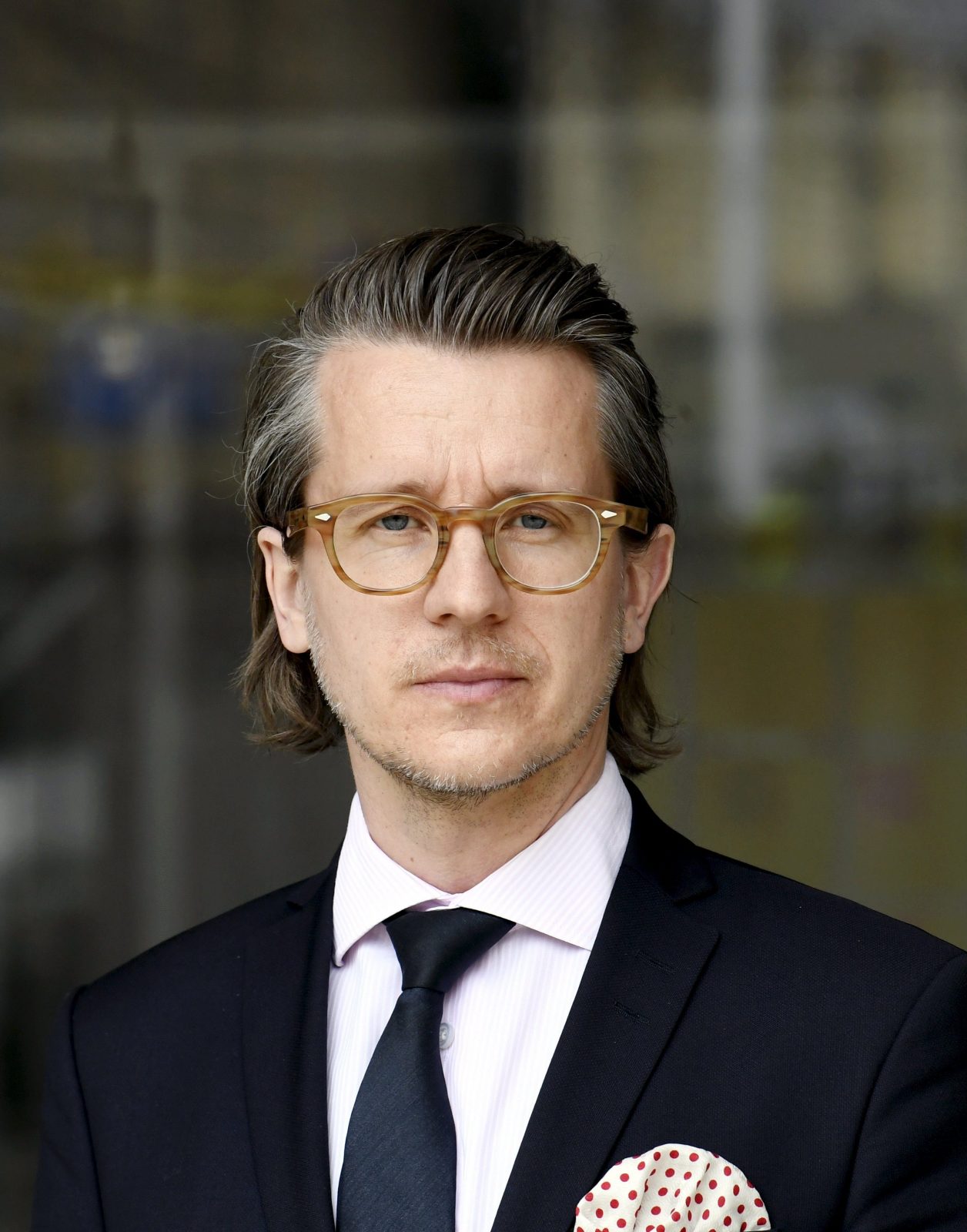
Sakari Melander works as a Professor of Criminal Law at the University of Helsinki. (JUSSI NUKARI / PRESS PHOTOGRAPH)
Professor of Criminal Law at the University of Helsinki, Sakari Melander, stares at the large screen intently.
“It really does make you wonder,” he says.
Melander has arrived at the offices of Helsingin Sanomat to look at the newspaper’s materials, which consist of the cases mentioned above as well as many others, such as:
INVESTIGATION 5500/R/XXXXX/18
HELSINKI, 2018.
According to the criminal complaint, the immigrant man had been working at a restaurant for nine months without pay, hoping to get a residence permit. The man had worked from morning till night and slept at the restaurant. The criminal complaint also names a witness who was working under the same conditions.
For nine months, nothing was done in the investigation. Then the police called the victim’s lawyer.
It turned out that the victim wanted to withdraw his complaint. The police documented that the lawyer had told them that his client had gotten all the wages he was due.
When contacted by Helsingin Sanomat, the lawyer says that he had said nothing about wages. His client had just told him about wanting to withdraw the claims.
Based on the explanation given, this is a private dispute that has since been settled, stated the police. Nothing else was done. The named witness, also described to be a victim of exploitation, was not heard. The investigation was closed.
INVESTIGATION 5530/R/XXXX/19
ESPOO, 2019.
The criminal complaint stated that the cook had had to work without pay. When the man had asked for wages, the employer announced that he would not be paying anything. The employer also told the cook that if he asked for wages again, the employer would make sure that any restaurant he had connections to wouldn’t give the man a job.
The cook could not speak Finnish and knew nothing of his rights. According to the Labor Protection Authority, the case had indications of being labor exploitation, a crime. They stated that the police should at least question the victim of the suspected crime, the employer, and witnesses if needed, as well as investigate other issues.
A couple of months went by. Then, the police stated that there was no reason to open a criminal investigation. According to the police what has and has not been agreed upon is a contractual dispute, not a criminal matter.
It appears that practically the only thing the police had done was confirm that the company the cook worked for had not paid any money to his account. This fact was mentioned in the decision on closing the case, even though it supports the cook’s claims. Not a single person was questioned by the police about the matter.
Professor Sakari Melander considers it very strange that serious criminal cases are closed without even questioning the victim of the suspected crime. When cases are closed like this, Melander believes it’s reasonable to ask whether they have been adequately investigated.
“Human trafficking and exploitation closely related to it are such serious crimes that there should be a heightened interest in solving them.”
The professor points out that the threshold for opening a criminal investigation is low on purpose.
Professor Melander says that if the employer has taken advantage of an employee’s vulnerable position and refuses to pay wages, it is a criminal matter, not a civil dispute. Being in a vulnerable position can mean a number of different things, such as needing to stay employed in order to get a residence permit.
The law allows the police to exercise judgment on when the threshold for opening a criminal investigation is crossed. There must be adequate and concrete grounds for suspecting a crime. A mere allegation is not enough.
According to Melander, a mere allegation basically amounts to stating “I was assaulted somewhere last Saturday.” In the cases investigated by Helsingin Sanomat, the criminal complaints give a clear account of the circumstances and identify details such as the name of the employer and the place of work.
“At that point, you cannot really consider these to be mere allegations of crimes. The threshold for opening a criminal investigation is purposefully low, and it is the responsibility of the police to gather evidence to find out if a crime has been committed,” says Melander.
“If there are allegations related to serious crimes, such as human trafficking, it should be pretty difficult to argue for killing the investigation before it even starts. The thinking should never be, Oh, there is no need to look into this. Also, the victims might not have any real possibility of going to court on their own in order to try and collect their wages.”
Melander sees problems in many of the cases discussed in this article.
INVESTIGATION 5500/R/XXXXX/18
One criminal complaint against a cleaning company, for example, was dismissed by Helsinki police because the prosecutor had in an earlier case decided not to press charges against the same company. The earlier case had had as many as eight victims of suspected labor crimes.
“I would rather think that if there are new criminal complaints related to the same company, there would be more reason to investigate what goes on in that company,” says Melander.
INVESTIGATION 5530/R/XXXXX/18
According to the criminal complaint, the employee of a hair salon in Espoo was paperless, meaning without a residence permit and under threat of deportation. He worked twelve-hour days every day, for a year and a half, and was paid less than 400 euros a month. When the victim had sought help, he was taken into the Assistance System for Victims of Human Trafficking.
The police stated that there was no reason to suspect a crime in the matter.
One of the reasons given was that both parties had agreed on the work and had voluntarily and knowingly committed to the working conditions. According to the police, the employee was aware of the nature of the work, working times, and working conditions before he had started working.
Melander says that if an employee signs a contract that commits them to illegal working conditions, the employee’s consent is, according to law, null and void.
Another reason the police gave for closing the case was that, at least on paper, the hair salon’s profits were so low. According to the police, the employer had told the employee that they sign make a contract, but the company would not be able to pay the contractual wage.
“When it comes to figuring out whether a crime has been committed or not, absolutely no significance can be placed on a company’s claim that its profits are so low that it’s unable to pay even the minimum wage,” says Melander.
“If that argument were accepted, businesses in distress could always take advantage of, say, immigrants in need of a job.”
Yet another reason for closing the case was that the victim had decided to sign the contract of employment, and had also benefited from the contract while applying for a residence permit in Finland.
The fact that getting a residence permit is dependent on the job cannot be considered an argument against exploitation, says Melander.
On the contrary, being dependent on the work is exactly what makes the immigrant employee vulnerable, because it becomes extremely hard to quit.
Melander says that the cases discussed in the investigation by Helsingin Sanomat clearly show that the police need to think about how human trafficking, and other exploitation, can be better investigated.
“These cases paint a large picture that says: the authorities are unable to identify human trafficking.”

INVESTIGATION 5XXX/R/XXXX/19
The decision had to be fast. The man wouldn’t be gone for long.
A call to a women’s refuge. A taxi arrives at the house. Amina escaped with no money and knew next to nothing about Finnish society.
Amina was forced into marriage in her home country. She says that her opinion was not asked and her family did not allow her to say no.
The couple moved to Finland. Once they arrived, the husband’s behavior became controlling and violent. He forbade Amina from speaking to anyone and restricted her personal movements. He took Amina’s social benefits for himself.
He beat and raped her.
When Amina went to see a doctor because of her injuries, the man followed her into the office. Amina spent her days at home doing chores. If she asked her husband to do something to help, he would hit her.
“He said that he had paid my family for the marriage, so I was now his slave,” says Amina.
When she escaped, Amina was taken into the Assistance System for Victims of Human Trafficking. The decision states the following.
Your husband controlled your actions and kept you under his power with threats and violence. According to the proposal of admittance to the Assistance System, you have been put in a situation in Finland that violates human dignity, as you have been forced to live as a victim of exploitation and violence, and you have been the target of sexual abuse.
The police received a criminal complaint about human trafficking and rape. The criminal complaint described the conditions Amina was forced to live in.
This is how the police’s chief investigator interpreted the conditions: The matter is related to a married couple, and the criminal complaint also contains elements that have more to do with a married couple’s arguments and private disputes.
These statements are not explained further by the police. Human trafficking was never investigated, and Amina was not questioned about the conditions.
After closing the human trafficking case without investigating it at all, the police investigated assault and rape. The rape investigation eventually was closed due to an inability to gather enough evidence.
Because the police decided that they would not investigate the claims related to human trafficking, the police also forbade Amina’s lawyer from pointing out, during the interrogation, issues that were evidence of human trafficking. These questions could have clarified Amina’s conditions for the police.
“I thought that the police would investigate how he tried to enslave me. But they were not interested in it,” Amina says.
According to Amina, the interrogator would constantly interrupt her and press her for specific answers. If Amina could not remember something, the interrogator would lose her temper.
“I felt like crying, she scared me. She acted like she wanted to punish me for something.”
Amina’s support person as well as her lawyer also feel that the interrogator’s behavior was rude.
Amina speaks warmly about the help she received from the workers at the women’s refuge.
The behavior of Amina’s ex-husband was threatening. Amina noticed he was following her.
The Assistance System asked the police for an assessment of the security threat against Amina, so they could better ensure her safety. The police replied that the assessment of a security threat you have requested can be requested from the Finnish Security and Intelligence Service since the local police do not conduct assessments of security threats.
The Finnish Security and Intelligence Service’s job is to protect national security. It does not conduct security threat assessments regarding domestic abuse. These are conducted by the local police.
The police were asked for a safety device that would allow Amina to get help faster if needed. The police refused to give one and told Amina to call the emergency number if she was in need of help.
Amina speaks warmly about the help she received from the workers at the women’s refuge.
“They never made me feel like I was worthless. That gave me confidence. I found the courage to file for divorce, even though I knew that it would end my residence permit.”
Amina tried to get a new residence permit by working as a cleaner. However, the company did not hire her and instead offered her a freelance contract. Eventually, the back pain Amina got from being assaulted became worse. When Amina was forced to take a break from work, the company decided to terminate her contract.
Amina is too scared to return to her home country. She is afraid of her husband and her own family. Amina’s family blames her for the divorce and has disowned her.
Still, she does not regret escaping from home.
“When I came to Finland, I didn’t know that women had equal rights here. And the opportunity to live freely, even if you are divorced,” Amina says.
Amina knows that there are still a lot of women in Finland who live under the same conditions as her.
“I hope that those who are in the same situation realize that they can get help. I hope that if my daughter is ever in a similar situation, she will have the courage to leave, too.”
Amina heard that her ex-husband has brought himself a new wife to Finland.
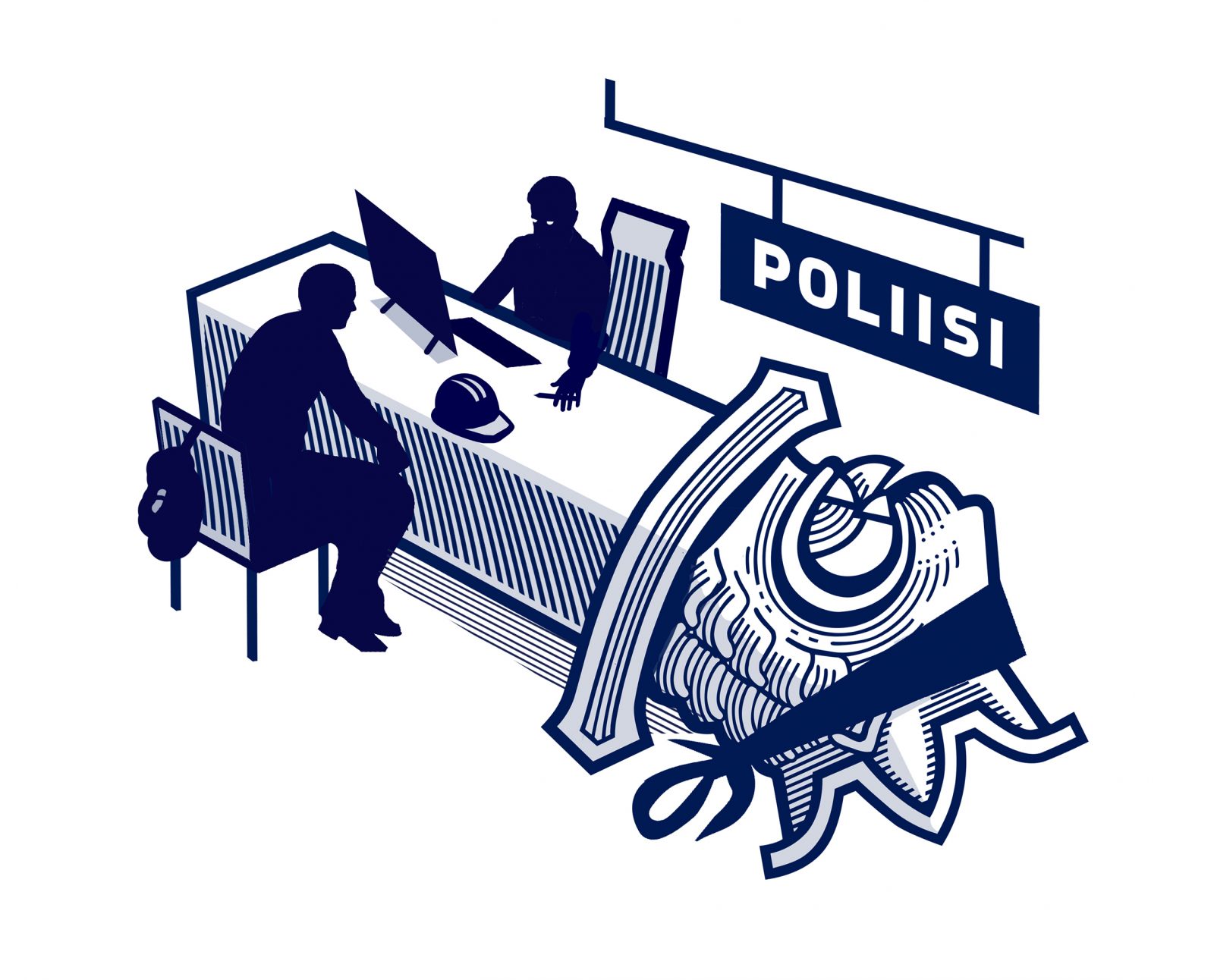
For a long time, people thought that there was no human trafficking in Finland.
The thinking was that if anything, Finland is a transit country. The crime didn’t even exist in Finland’s criminal code.
A change came from the United States of America. The Department of State regularly publishes an influential reports on human trafficking. At the beginning of the 21st century, Finland was put on the State Department’s list of shame for its passive attitude in the fight against human trafficking.
International pressure grew. As a result, Finland began taking action. Human trafficking was codified as a crime in 2004 with little effect. Five years later, there was only one final conviction.
The office of the Non-Discrimination Ombudsman, tasked with reporting on human trafficking, began a review. Its aim was to find out if Finland really was free of such crime or if the exploitation was simply not identified.
The review found that criminal cases were not being investigated, prosecuted, or convicted as human trafficking, even though they showed clear signs of being just that. The Finnish Parliament was notified of the review’s results in 2010.
Around the same time, a lawyer named Emilia Kaikkonen started her career.
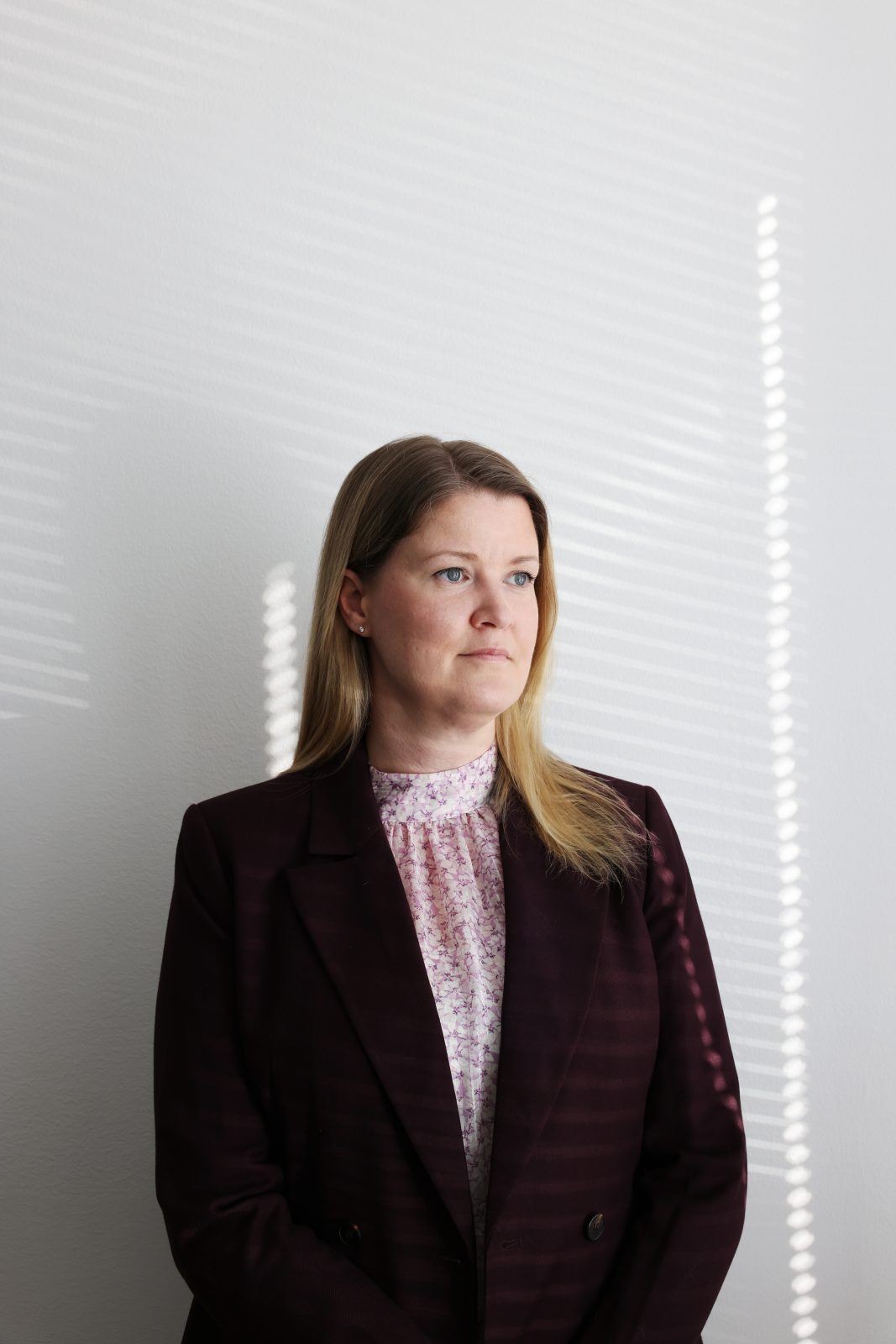
Emilia Kaikkonen is an attorney specializing in human trafficking. (SAMI KERO / HS)
Kaikkonen wasn’t supposed to end up working on human trafficking. During a seminar for her Master’s thesis at law school, the person next to her took the topic she had wanted. Instead of terrorism, she ended up writing about the exploitation of foreign labor.
Kaikkonen worked as the victims’ counsel when a case related to a Chinese restaurant in Savonlinna, a small Finnish city, was going to court. It was one of the first human trafficking investigations in Finland.
Since then, Kaikkonen has been involved in almost every significant case, from Vietnamese nail salons and a Romanian sex trafficking league to Thai berry pickers and abusive cults. She has represented hundreds of clients. Kaikkonen is also a member of the criminal law expert group of the Finnish Bar Association, which she represents in matters related to human trafficking.
“For a long time, it seemed impossible to get anything even investigated,” Kaikkonen explains in her Helsinki office.
Today, this type of exploitation is identified better. But the situation is still dire.
Kaikkonen deals with other crimes too and sees how those are investigated.
“Investigations of exploitation, such as human trafficking, often seem to get killed early. A lot of times these cases just aren’t investigated.”
Kaikkonen believes that the police and the prosecutors often take on the role of a judge. She explains that, in criminal cases, the evidence is rarely completely one-sided. Where in other crimes, contradictory evidence is taken to the judges to be decided on, with human trafficking and similar crimes the investigation is often closed or the prosecutor doesn’t press charges.
According to Kaikkonen’s assessment, the authorities often do not understand what the crime of human trafficking means. The term brings up images of the slave trade, but in reality, modern human trafficking is often a matter of a much more subtle kind of control.
Domestic relationships can also have characteristics of human trafficking, as we found in Amina’s case. This is also something the police seem to have problems identifying.
“There are many cases where the domestic relationship resembles human trafficking. Very often this is either not recognized or the trafficking investigation is closed almost automatically,” Kaikkonen says.
Investigating all the crimes in question isn’t just about bringing the perpetrator to justice. Whether a particular crime is investigated or not can affect the victim’s right to compensation, a residence permit, or free counsel.
Human trafficking often means continuous exploitation. It is in a sense a process crime, unlike crimes such as assault or rape, for which one can often define a more specific time and place.
Continuous conditions of exploitation could yield more evidence. However, it’s typical that domestic violence cases which bear signs of human trafficking are just split into parts, each of which is separately investigated.
“Singular cases of assault, illegal threats, or cases of rape might move forward in the criminal process but the wider exploitation is not identified,” Kaikkonen explains.
If the victim has been isolated from the rest of society and, for example, cannot get to a doctor in time, investigations into singular events might fail due to a lack of evidence. Even if they don’t, the punishment is often minor compared to how severe the continuous exploitation has been.
One example of this recently became public.
Finnish President Sauli Niinistö pardoned a woman who had stabbed her husband in self-defense. She was sentenced because, despite the violent husband who had threatened to kill her while holding a knife, the court had deemed that she had gone too far in defending herself.
Based on an interview the woman gave to the newspaper Ilta-Sanomat and backed up by official records, she had been the victim of forced marriage and severe abuse that lasted for years. The authorities, however, had failed to identify her as a victim of human trafficking.
The violent husband was investigated for a number of singular events. He was eventually given a conditional prison sentence for just three assaults and one illegal threat. She, on the other hand, would have had to go to prison had it not been for the presidential pardon.
The police don’t even file a criminal report in all of the cases.
Poor investigations are not just a matter of resources or competence. They also reflect the attitudes and priorities of the police.
Finland has seen excellent examples of human trafficking investigations in cases when the authorities have decided to put in the effort, says attorney Emilia Kaikkonen.
The situation is familiar to many police officers. A number of them told Helsingin Sanomat that some police departments try as quickly as possible to close, or “kill,” cases of human trafficking without investigating them.
The reason is that the cases are laborious, difficult, and to some police officers of not much interest. The police officers who spoke to HS asked to stay anonymous due to the sensitive nature of the matter.
HS has also interviewed about ten lawyers from different regions of Finland. Most of them have had similar experiences of poor investigations regarding human trafficking and related crimes. Two of the lawyers said that they grew so frustrated they decided to quit and change their line of work.
At an NGO that helps victims of human trafficking, the frustration is shared.
“Many of our clients have felt that the police expect them to hand over all possible evidence to the authorities as soon as they report a crime. Even though gathering evidence is the responsibility of the police,” says Pia Marttila, an expert at Victim Support Finland.
According to Marttila, sometimes the police don’t even file the cases as possible crimes. Even in cases where the police have received legitimate criminal complaints, including information about evidence and witnesses, the case has been filed away as “miscellaneous” and not as a potential criminal matter.
It is much easier to close a case that was labeled as “miscellaneous” than it is to close a criminal case. How a case is labeled can also affect the victim’s chance of getting a lawyer.
According to Marttila, some of the problems in human trafficking investigations have been recognized. A new national human trafficking task force in the police was set up at the beginning of 2021. However, it only investigates a portion of the cases. The vast majority of investigations will still be the responsibility of local police.
One of the main aims of the task force is to detect and dig up criminal activity. That means the police expose exploitation proactively on their own. Marttila says that even though this is important, it becomes meaningless if the criminal complaints that have already been made are not investigated.
Suspected victims of human trafficking, who reported crimes years ago, are still waiting on their cases to be investigated.
“On the other hand, a situation where more recent cases end up at the back of the queue is not ideal either. All cases should be investigated without undue delay,” Marttila says.
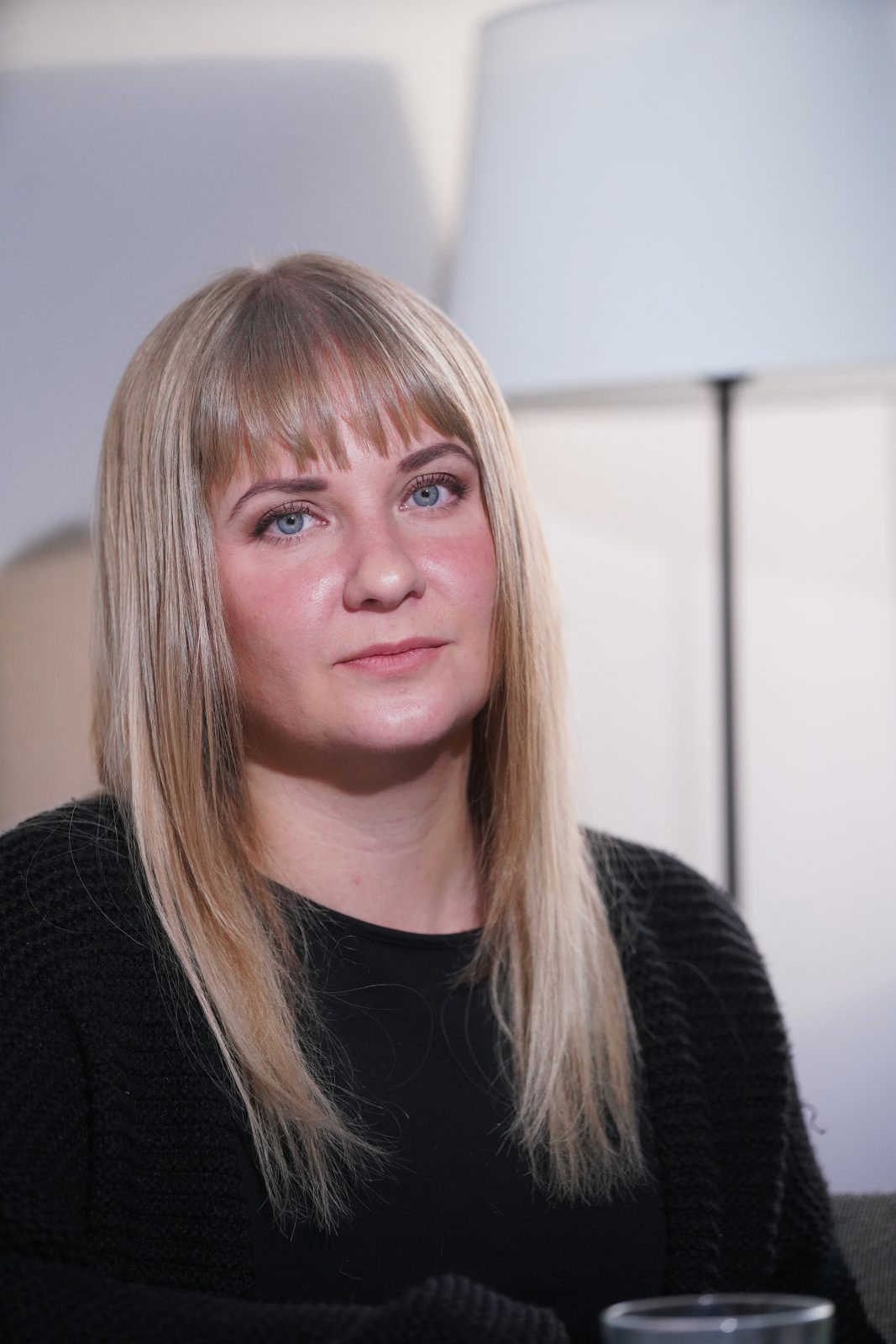
Pia Marttila, an expert at Victim Support Finland. (SAMI KERO / HS)
Marttila often hears claims that victims of trafficking know the Finnish system and make false claims in order to be able to stay in Finland. She says that these claims are hard to comprehend because reporting a crime often leads to problems for the victim’s residence permit.
For many victims, filing a criminal complaint about exploitation has caused years of anxiety, fear of deportation, and even violence. It has also destroyed victims’ livelihoods as they have lost their jobs and are shut out of their communities.
Many clients of Victim Support Finland cling to the job offered by the abuser as a last resort. Some only realize they have been exploited when they don’t get the employment contract or residence permit they were promised by the employer.
Attorney Emilia Kaikkonen believes that one factor explaining the poor state of investigations is that most victims of human trafficking in Finland are immigrants.
“This situation is partly explained by prejudice. Certain biases are easy to see.”
According to Kaikkonen, the authorities might have strong prejudices and believe that the only reason the victim is claiming to have been exploited is to avoid deportation.
This is manifested, for example, in situations where the victim who has filed a criminal complaint is, in fact, interrogated as though they were the suspect. The victim is pressed about the basis of their residence permit and asked why they are not ready to go back to their home country. At the same time, many questions that would be essential to solving the crimes are not asked.
This prejudice is abundantly clear in Viktor Podolianchuk’s case. The Ukrainian construction worker was nearly deported after his Finnish employer accused him of theft. However, the police were reluctant to investigate the Ukrainian’s claims that he had been exploited.
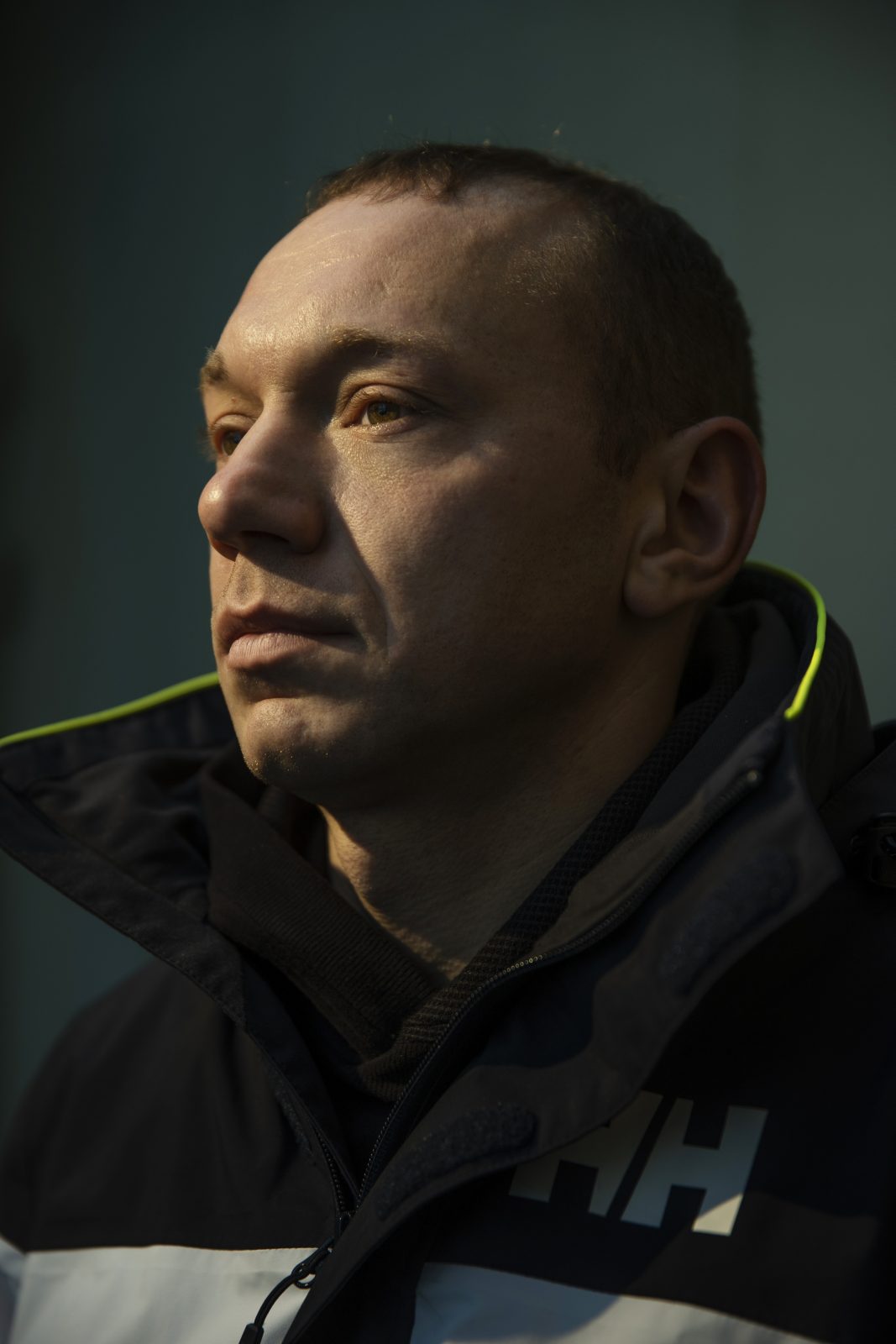
The Ukrainian roofer Viktor Podolianchuk came to Finland for work in 2016. The Assistance System for Victims of Human Trafficking filed a criminal complaint about his work conditions, but the police were reluctant to investigate the case. (SAMI KILPIÖ)
INVESTIGATION 5650/R/XXXXX/18
Over the years, Viktor Podolianchuk had worked in Finland numerous times. In 2016, he found work in a construction company located in the town of Salo in Southwest Finland. The company had sites all over Finland.
In the beginning, Podolianchuk received his pay in a regular manner. Then things changed. This is what he says happened:
When his work visa expired, his workdays got significantly longer and the payments stopped. His employer promised to pay him his wages once he had his residence permit in order. When Podolianchuk complained about the situation, the employer threatened to have him deported.
When he couldn’t afford rent, Podolianchuk slept in an old caravan that was standing in the warehouse area of the construction company. There was a hole in the roof, and water would get in when it rained. There was no toilet or shower. The heater would act up, and Podolianchuk recounts how on nights with subzero temperatures, he would lie awake, unable to sleep because he was so cold.

When Podolianchuk ran out of money and couldn’t afford rent, he lived in a caravan that would be freezing cold in the winter.
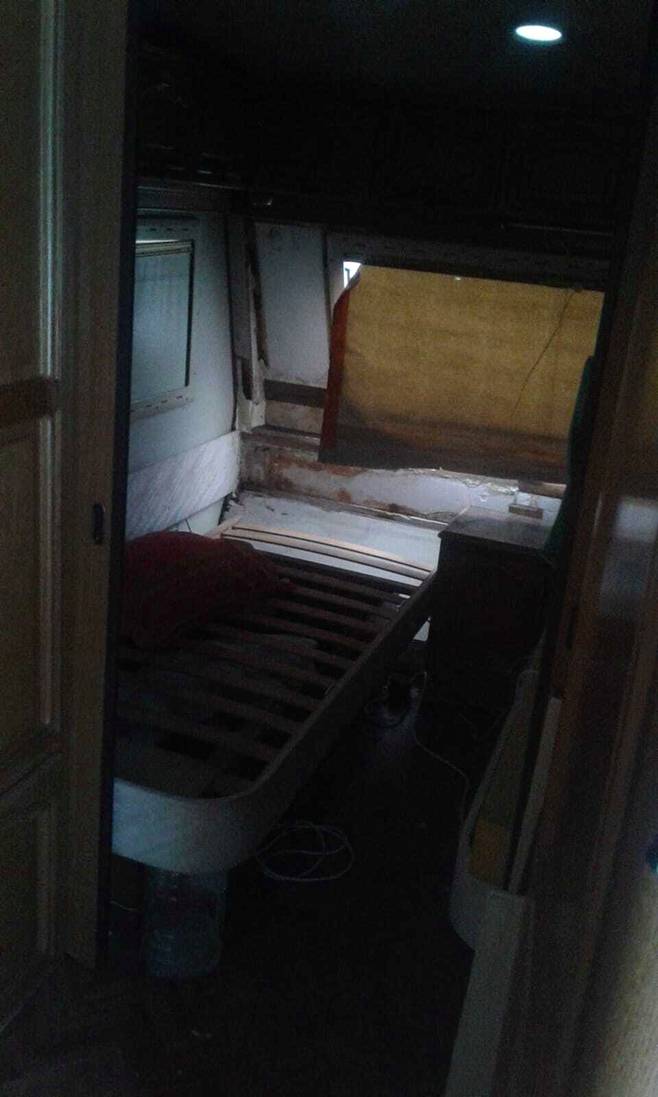
The caravan was in bad shape. Because he was so cold, Podolianchuk would stay up all night when it froze.
Podolianchuk worked for about four months without getting paid. When his residence permit was almost due, the owner of the construction company asked how much the company owed him. Podolianchuk replied that it was at least 14,000 euros.
About a week later, while Podolianchuk was in Espoo working on a customer’s roof, the police showed up.
He spent three weeks in detention. The employer had told the police that Podolianchuk and another immigrant worker had stolen metal equipment from the worksite. According to Podolianchuk, he had taken the equipment to the company’s warehouse as he had been instructed. He drew a picture of the area for the police and told them what the equipment looked like. Podolianchuk asked the police to go there and see for themselves. The police refused.
While the investigation into the alleged theft moved forward, Podolianchuk tried to get the money he was owed. Since his wages weren’t being paid, he decided to make a criminal complaint. The Assistance System for Victims of Human Trafficking took Podolianchuk on as a client. The Assistance System filed a criminal complaint about human trafficking.
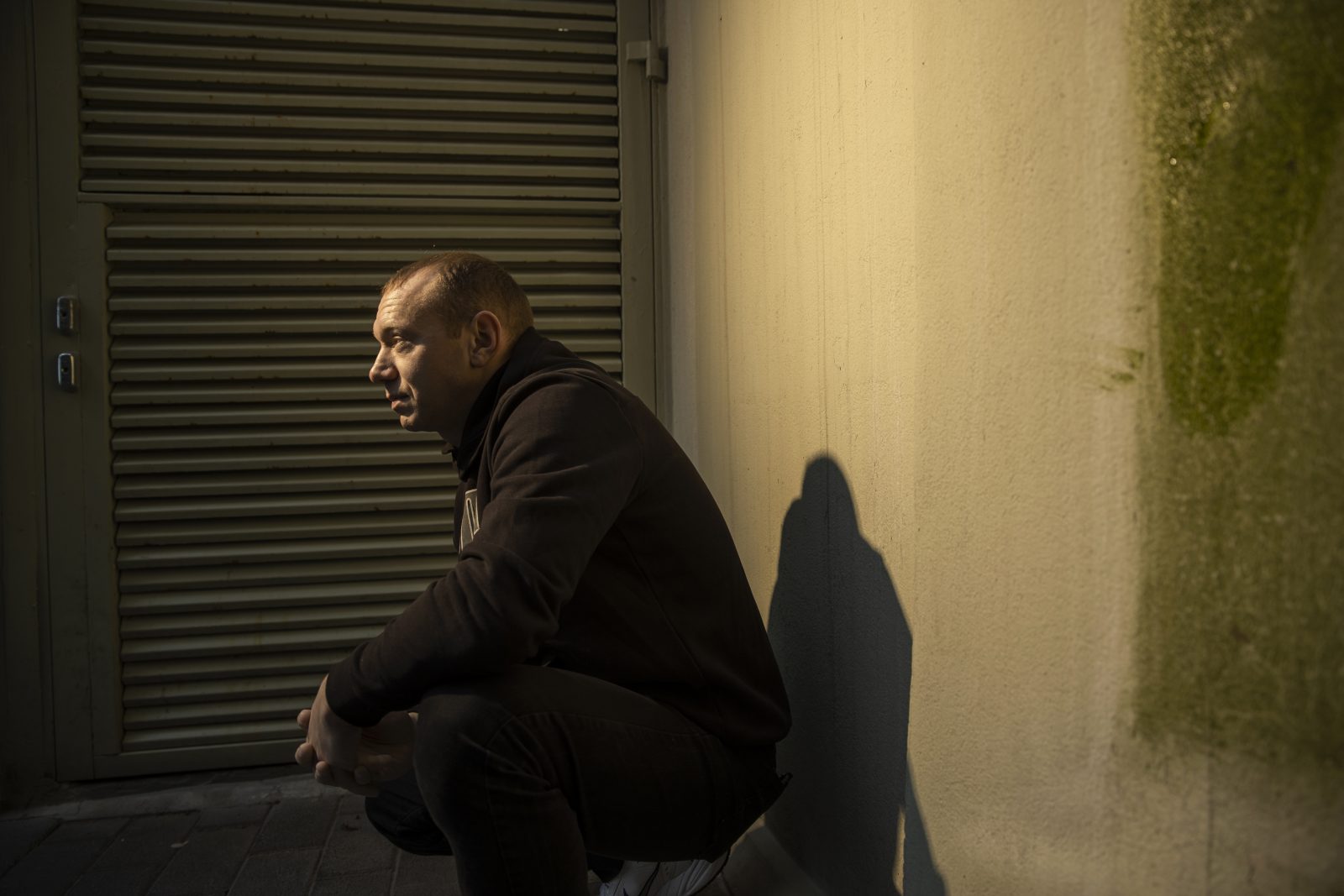
Viktor Podolianchuk says he is disappointed that the police weren’t interested in investigating his exploitation claims. (SAMI KILPIÖ)
Information on bank transfers, which were given to the police, showed that no payments had been made to Podolianchuk’s account for months. Podolianchuk had records from the company, showing that he had worked full days that often dragged on until late. He provided messages that he exchanged with the owner as evidence. He had multiple witnesses.
Helsingin Sanomat was able to contact an Estonian construction worker one of the named witnesses, Rolf Räis. Räis helped Podolianchuk survive by loaning him money for food and winter clothes. Räis says that what he saw confirms Podolianchuk’s claims about his working conditions.
Räis also had his fair share of problems with the company. In 2018, a court ordered the construction company to pay Räis over 50,000 euros in wages and compensation for illegal furlough and termination of employment.
Podolianchuk’s human trafficking investigation was transferred to Salo’s police station because the company was registered in Salo. Records kept by the Assistance System for Victims of Human Trafficking offer a window into how the investigation progressed. Podolianchuk gave these records to Helsingin Sanomat.
In March 2017, Terhi Tafari, a senior inspector at the Assistance System, asked the police department whether they were opening a criminal investigation.
The police officer in charge of the investigation replied that, for now, it seems that the claims of theft [against Podolianchuk] will need to be investigated first. Very different stories of the same situation, he says, Tafari recorded.
Podolianchuk’s lawyer asked the police to hear the witnesses quickly because they would have to leave the country soon. The police did not reply to the lawyer’s messages.
Senior inspector Tafari managed to get in contact with the police sergeant investigating the case. This is what Tafari wrote down about her conversation with the police sergeant:
We are discussing the essential elements of the crime. I state that, at least from our perspective, it seems that the unpaid wages, accommodation that violates human dignity, the threats and taking [Podolianchuk’s] passport indicate extortionate work discrimination, aggravated extortion, or even human trafficking.
[The police sergeant] says that they know that “the victim has been so and so and blah blah blah, nasty conditions blah blah.”
He [the sergeant] says that he has enough work experience, and in a town this small they know people well enough and know how they operate. And that Ukrainians often have a habit of reacting to things in their own way.
Tafari continues her conversation with the police sergeant and records the following: I return to the issue of unpaid wages. There is very clear evidence of it. [The police sergeant] states that he knows about them. According to him, Viktor could be liable to pay the employer sum as compensation [for the alleged theft] that far exceeds the amount he’s owed in wages.
According to the records, the police sergeant went on to say that the Finnish employer had not paid Podolianchuk because the employer was expecting Podolianchuk to pay him a lot of money as compensation for the theft.
Tafari replies: I state that the employer has the right to withhold these wages by any means, especially when no conviction has been made in the case. [The police sergeant] replies that this is true, the employer doesn’t have the right to do this.
After this, the police informed Podolianchuk that they will not open an investigation into whether or not he was the victim of exploitation. The office of the Non-Discrimination Ombudsman also inquired about the case. It received the same information from the police: no witnesses would be heard and no investigation would be opened.
Podolianchuk’s lawyer tried to ask the police for a reason.
“They repeated that there are always two sides to a story, and now we’ve only heard one. When I said that surely the very point of a criminal investigation is to get an objective view of what happened and that this can only be done by the police, they responded by being belittling,” says the lawyer.
The police were already making preparations to deport Podolianchuk from Finland. The lawyer reminded the police that, again, the witnesses would soon leave the country and Podolianchuk might also have to leave soon.
“The way the police reacted indicated that this is exactly what they hoped would happen since that would make it impossible to conduct a criminal investigation that was so unpleasant for them.”
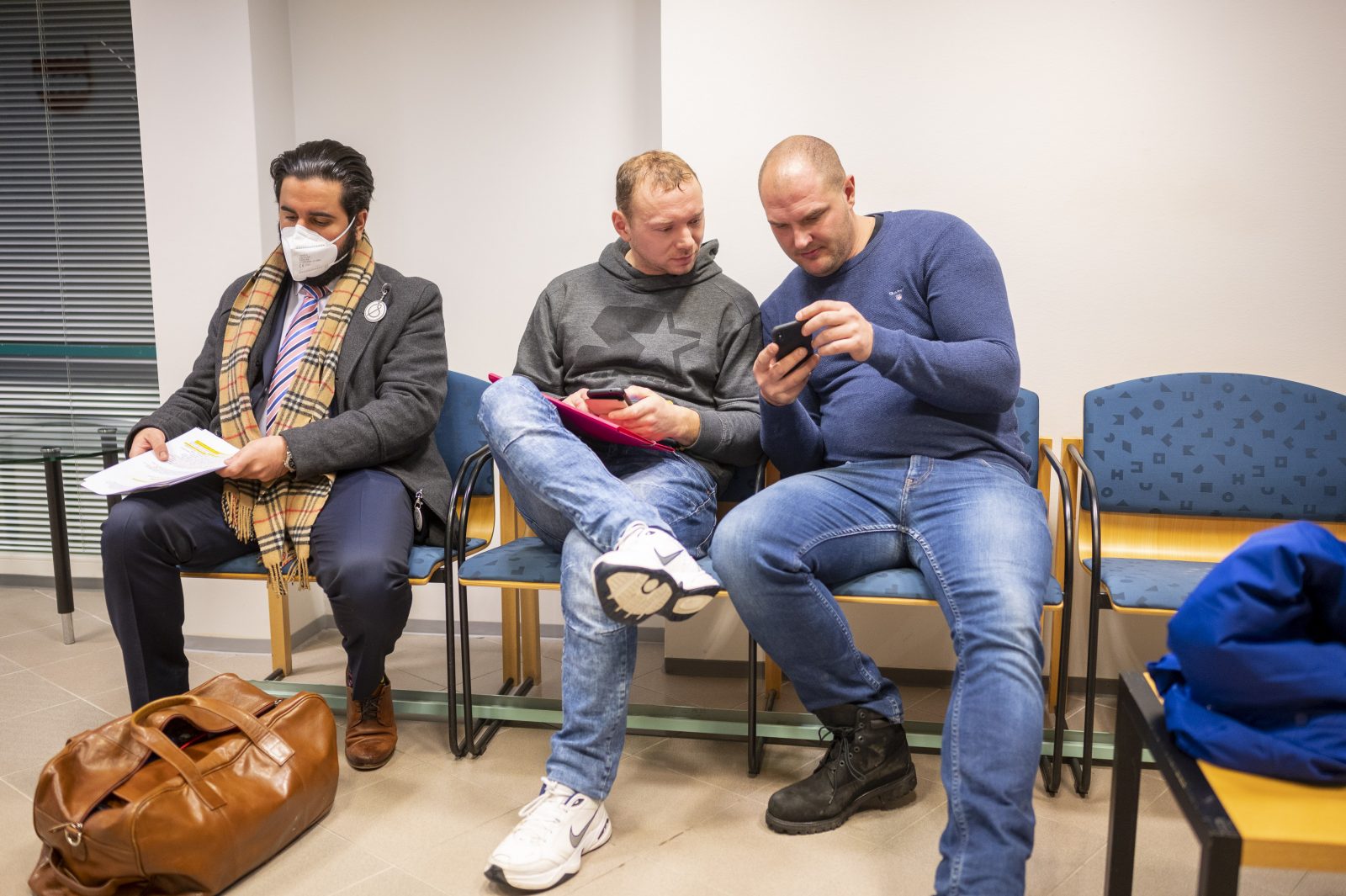
Viktor Podolianchuk (middle) waiting on a court session to begin with witness Rolf Räis (right) and his lawyer Tirnash Ramezan. Podolianchuk was accused of working illegally, in a case heard at the Southwest Finland District Court in Salo. (SAMI KILPIÖ)
When reached for comment by Helsingin Sanomat, the chief investigator of the case admits that the investigation became a “farce” as it bounced from one police department to another. When asked specific questions, he directed HS to the investigating police sergeant.
The police sergeant in turn directed HS to the chief investigator. He also stated that he “doesn’t have to confirm or deny” whether he made the comments recorded by the Assistance System.
The owner of the construction company denies that Podolianchuk has been exploited in any way. According to the owner, he had agreed that Podolianchuk would “work a little” while he was waiting for the work permit, and the owner claimed he didn’t understand this was illegal. The owner says that Podolianchuk was supposed to be paid for all the hours he put in, as soon as he had a valid work permit. The owner denies threatening Podolianchuk in any way or taking his passport.
In May 2017, Viktor Podolianchuk received a conditional one-year prison sentence for aggravated theft. He was ordered to pay 38,000 euros in compensation to the owner.
The human trafficking case was, at this time, still pending. Podolianchuk was questioned at the end of 2017. However, he was heard as a suspect because he had been working without a work visa. According to the police documents, an official criminal investigation into human trafficking had not even been opened.
Podolianchuk says that when he was questioned, the police asked him nothing about the potential exploitation, but instead kept asking him if he had had permission to work. This description is supported by the record of the police investigation.
The interpreter ran out of time, and the interrogation had to be concluded. A new session was never arranged.
None of the witnesses Podolianchuk named were questioned.
The Court of Appeal gave its decision in the theft case in the summer of 2018. Podolianchuk was acquitted of all charges.
The metal equipment that was claimed to have been stolen had been clearly visible in the company’s warehouse area the entire time. Because the police had refused to check it, Podolianchuk’s colleague Rolf Räis, the Estonian, had gone to the area himself and taken pictures of the equipment.
Podolianchuk’s lawyer says that after repeated demands, he was able to get the police to go to the area. After the verdict given by the District Court, the police finally went to the warehouse area and documented the equipment.
In its decision, the Court of Appeal also questioned the logic of thinking that Podolianchuk would take a huge risk by stealing scrap metal, that was nearly worthless, while he was waiting for his residence permit.
The police’s decision on the human trafficking investigation came over two years after the criminal complaint was made. According to the police, the investigation found no evidence that Podolianchuk had been in the kind of dependent or subordinate position that would cause suspicion of human trafficking.
The investigation was closed. According to police documents and comments made by the chief investigator, none of the witnesses named by Podolianchuk were questioned, and the police didn’t seem to do much at all to investigate the alleged exploitation.
Podolianchuk filed another criminal complaint. The police didn’t open an investigation.
Podolianchuk got a new lawyer and filed yet another criminal complaint. The complaint named multiple witnesses and different types of evidence. The request to investigate was directed to the police department of Western Uusimaa in the hope that the case would not be investigated in Salo.
The investigation was transferred to Salo.
Podolianchuk had also sought compensation through a civil suit. In December 2019, the construction company was ordered to pay him nearly 60,000 euros in wages and compensation for, among other reasons, discrimination and illegal termination of employment.
However, the company was bankrupt. The owner continued to run his business through another company, and it seemed to be very profitable. According to a recent financial statement acquired by Helsingin Sanomat, this company made a profit of nearly 350 000 euros with a turnover of over a million euros.
Podolianchuk has received money from the wage security fund, but he has not gotten a penny out of the bankruptcy estate.
But, Podolianchuk says, money is not the reason he has been demanding his rights.
He just wants to be treated equally before the law. Like everyone else.
Podolianchuk still works as a roofer and plans to bring his wife and child to Finland if he can get a longer residence permit. A new human trafficking investigation has now been opened in his case.
“Four years! For four years I have waited for my case to be investigated. I am sure that they will close the investigation again,” he says.
Podolianchuk’s case dragging on for years is not an exception. It is more or less the norm.
One human trafficking investigation of a Nepalese cook stalled at the Eastern Uusimaa police department for three years, with nothing being done by the police.
An investigation into human trafficking in a Bangladeshi restaurant in Oulu took four years, with very little done in that time.
In a number of cases, the investigation has been pending for so long that even the right to prosecute for many exploitation crimes has expired.
According to Pia Marttila from Victim Support Finland, it is unusual for an investigation into trafficking or similar crimes to take less than a few years. It’s not unusual that the victim is questioned for the first time after over a year has passed since the criminal complaint.
Helsingin Sanomat has reviewed many cases where a criminal complaint about human trafficking has been filed a couple of years ago and not even the victim has been questioned.
“Many of our clients are concerned that after such a long period of time evidence is no longer available and witnesses cannot be reached. If the criminal investigation then eventually fails, it understandably creates a great sense of injustice,” says Marttila.
“People don’t seem to understand how much the victims have riding on these cases. How big of a personal risk they take.”
According to the law on criminal investigations, crimes must be investigated “without undue delay.” Professor Sakari Melander says that investigations that have stalled for years clearly seem to be illegal.
“It is completely inappropriate to first let a long time pass without investigating the crime at all, and to then close the investigation based on the grounds that there is no evidence.”
Human trafficking investigations may collect dust for years.
Human trafficking and related crimes fall within the scope of “formal prosecution.”
That means that when the possible crime has come to the authorities’ attention, i.e. when the police have decided that there is reason to suspect a crime, the matter must be investigated. It is mandatory for the police to investigate it. The investigation cannot be closed purely on the grounds that the victim withdrew their claims.
Many crimes fall under formal prosecution, but their importance is heightened with serious crimes such as human trafficking. The idea is that crimes like these don’t just violate the victim, but society in a larger sense, and there is a larger societal interest in investigating them.
In addition, formal prosecution is a means to protect the victim and the interests of justice in cases where the victim is threatened or pressured to withdraw their claims by, for example, the perpetrator.
Despite this, the investigation by Helsingin Sanomat reveals that the police have closed investigations into serious crimes on the grounds that the victim withdrew their statement. This has even happened in cases where there have been clear signs that the victim was being pressured or threatened to do so.
The following two cases are examples of this.
INVESTIGATION 5590/R/XXXXX/19
The criminal complaint was sent to the Häme police department by the Assistant System for Victims of Human Trafficking.
An immigrant woman had said that her husband had been forcing her into prostitution for a long time and this had continued after they had arrived in Finland. According to the woman, the man raped and assaulted her repeatedly. She also said that the man had sexually abused her child.
The police opened an investigation into human trafficking. A couple of weeks went by. During that time, the man got in touch with a lawyer.
Soon, the police received a statement. In it, the woman withdrew her claims, said that no crime had been committed, and claimed the allegations she had made were due to her illness. In the statement, the woman wrote that because of her illness, she had also forced her child to lie to the police and child protective services.
The police closed the investigation. When contacted by Helsingin Sanomat, the police admitted they had not questioned the woman after receiving the statement. They also admitted that the man, suspected of human trafficking, had not been questioned at any point.
Potential witnesses, like those who had helped the woman in a women’s refuge, were not questioned. No coercive means of the investigation were used. According to the police, the question of whether the woman had been pressured to withdraw her statement wasn’t really investigated.
The chief investigator of the case told Helsingin Sanomat that the investigation was closed because the woman withdrew her statement. The chief investigator compared it to a situation where someone reports their bike stolen but later says that actually it wasn’t stolen after all.
The Häme police department had previously, a year earlier, opened a separate investigation into abuse the woman had faced. However, nothing had been done; the woman was not questioned within the year, and then she said that she was withdrawing her statement.
After the recent human trafficking investigation was closed, the woman told another police department about the exploitation she had suffered. This police department has now opened an investigation. It suspects the man of rape and illegal threats. In addition, the man is suspected of sexually abusing the child.
INVESTIGATION 5620/R/XXXX/17
A similar decision was made in a case that had to do with the forced labor of a Pakistani man.
Employers moved the man between two restaurants, in the Southeastern cities of Lappeenranta and Kouvola. The man worked around the clock for little pay or no money at all. The employers threatened the cook that if he complained about the conditions, they would make sure that he was deported. When the man finally fell ill, he was thrown out of the job.
The police opened an investigation into extortionate work discrimination. The Pakistani cook’s allegations were supported by the statements of two witnesses. The cook told police that the employers had pressured him and had threatened his family back in his native country.
Then, it seems like the investigation ground to a halt.
Six months later, the Pakistani man came to the police station. With him, he had a document. It was an agreement he had made with one of the employers, facilitated by the service union PAM.
The cook had previously told the police that he had worked for no pay in the restaurant, for almost four months full-time. According to the terms of the agreement, he would get a sum of 3,000 euros and withdraw all claims he had made to the police.
This raises a question: why is the trade union PAM facilitating agreements like this?
On receiving the agreement, the police closed the investigation into the employer in question. The case documents show that the police encouraged the cook to make a similar deal with the other restaurant owner.
After the last questioning, it was mentioned that you would make an agreement with [the suspect]. How did it go? the police investigator asked.
The cook replied that the employer had refused to make an agreement. They didn’t want to pay me any compensation, he said.
PAM had calculated that this restaurant owed the man more than 53 000 euros in wages. Soon, this other employer also promised to pay the cook 3 000 euros, on the condition that he withdrew his claims to the police.
Even though the suspected crime is serious and subject to formal prosecution, the police were satisfied with the agreement. They proposed that the prosecutor close the investigation, on the grounds that the suspected crime was so minor. The prosecutor gave his blessing. The investigation was closed.
Attorney Emilia Kaikkonen says that if the police are already investigating a crime that is subject to formal prosecution, by law the investigation mustn’t be closed simply on the grounds that the victim has withdrawn their claim.
Agreements made by the victim with their exploiter can reduce possible compensation later. However, such agreements shouldn’t make any difference with regard to the criminal investigation.
Professor of Criminal Law Sakari Melander agrees with this. He considers the “agreement” made by the Pakistani cook to be so blatant that it in itself indicates exploitation.
A majority of the victims of human trafficking or similar crimes are too afraid to speak to the police at all. Those who do may face pressure and threats, Kaikkonen explains.
“It would be important to try and find out why someone is withdrawing their statement. Or how someone is made to sign an agreement that is not beneficial to them at all.”

The police make decisions that are often final.
Only a few victims have the ability to file a complaint about a decision to close the investigation or to seek justice in other ways.
Filing a complaint may involve financial costs. In addition, many people do not want to relive traumatic events.
For example, one woman interviewed for this article described that during the criminal investigation, she would suffer frequent panic attacks, anxiety, depression, and insomnia. She didn’t want to go through that again and therefore didn’t file a complaint about the decision of the police to close the investigation into her human trafficking case.
Many victims experience shame and go through a dark period when the investigation into their exploitation is closed, says Pia Marttila from Victim Support Finland. The victim might wonder whether they should have listened to their abuser who told them that there was no point in going to the police.
Many don’t seek restorative justice simply because they have lost their faith in the justice system.
All this highlights the importance of how the police act. Professor Sakari Melander is concerned about the fact that human trafficking investigations in Finland can be in such a poor state.
“What kind of a signal are we giving about the functioning of the criminal justice system? This really is a huge problem,” he says.
“Now we have to figure out the causes of this and start taking corrective action. Also, in these circumstances, there is a strong argument for re-opening investigations, in the interests of establishing criminal liability.”
Attorney Emilia Kaikkonen thinks that the current situation sends a clear message to the perpetrators as well as the victims: exploitation is not effectively addressed and seeking help might even worsen the victim’s situation.
Word gets around. How many victims who have been sexually abused, forced into work, marriage, or prostitution, or have been otherwise oppressed, are forced to settle for this fate?
Kaikkonen believes that investigating these crimes is also important as a matter of principle.
“Human trafficking is one of the worst crimes that can be done to someone, it so clearly violates a person’s freedom. Stopping this type of exploitation has to mean something in our criminal justice system.”
The police are the first link in a society built on the rule of law. What do we have left if they fail?
The Finnish people trust the police.
We believe in the system.
We trust that at least serious crimes are investigated, victims get justice and the perpetrators are held responsible for their actions.
The Finnish people believe that the police do everything in their power to solve the crimes reported to them. The leadership of the police assures us that the police protect the fundamental rights of everyone.
But do they?
Does the police effectively tackle those crimes that have little impact on the majority of the population?
Or is the population’s high level of trust in the police based on the fact that so few have experienced serious criminal investigations? In other words, is the trust based on the false image that crimes are always well-investigated?
The police are responsible for guarding a lot.
They make decisions that have far-reaching consequences.
For the person who files a criminal complaint about the exploitation they have faced, the decision of the police might be one of the most important ones in their life.
The police are the first link in a rule-of-law state.
What is left if they fail?



